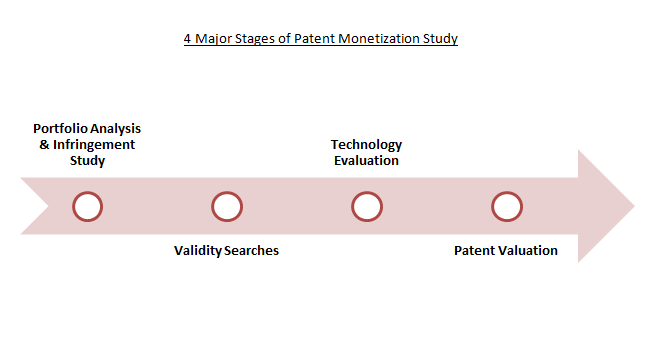Technology Evaluation Reports: Who Needs it and Why?
Before a company, start-up or an investor plans to invest in a new technology, its evaluation is done to determine whether it has the potential to be commercialized. This process is known as Technology Evaluation.
To define it in simple terms, Technology Evaluation is a set of principles, methods, and techniques or tools for effectively assessing the potential value of an invention (patented or non-patented) and its commercialization. A thorough evaluation assesses the invention’s value from technical, market and legal perspectives and reconciles the results within a valid methodology.
Table of Contents
Who needs it and why?
Technology Evaluation as a part of a monetization study or a stand-alone study can be used both by owners of a technology or by a prospective buyer of the technology. Technology evaluation studies can also be integral for incubators and/or investors looking to invest in a new technology.
For Owners of the technology: For an owner to commercialize their technology portfolio, it is integral that the technology in question is thoroughly evaluated to understand its feasibility and potential for successful implementation, appropriate markets and target customers and the ability of the technology to impact/disrupt the current market scenario. It also helps to determine the competitive landscape in case the said technology can be commercialised as well as identify the potential licensees for the said technology.
- Corporates/MNCs: Patents/New technologies are important assets for a company and can be a high contributor for the company’s revenue/monetary advantage and thus, successful commercialization of the patent portfolio can give a company the much required market and competitive edge.
- Start-ups/Technology Companies: Multiple start-ups are based on their disruptive technologies and thus commercialization of the patent portfolio covering the technology becomes crucial for their survival and growth.
For Buyers of the technology: During acquisition of a start-up/SME or their technology, or during investment in a new venture, a legal due diligence is always conducted to evaluate and ensure the right fit of the target technology. Similarly, a technology evaluation helps in determining whether the acquisition target is the best choice, and it also evaluates its potential.
Incubators/Consultants: For entities facilitating business development of SMEs or funding for start-ups, it becomes necessary to have a portfolio of solid technologies. Thus, technology evaluation studies are very helpful in deciding which technologies should be moved to the market and which of those can be shelved. Detailed technology evaluation reports can also be used to demonstrate the potential and capabilities to a prospective investor or buyer.
As a part of Monetization Study
Patent Monetization study is the process of evaluating a technology’s monetary potential, validating the technology, and identifying the appropriate strategies for commercialization. The Patent Monetization study is conducted in four major stages:

- Portfolio Analysis & Infringement Study
- Validity Searches
- Technology Evaluation
- Patent Valuation
Thus, technology evaluation reports are an integral part of a Patent Monetization Study. Read our article on patent monetization case study here.
Aspects covered in Technology Evaluation Reports (TER)
Technology evaluation reports are a systematic attempt to foresee the consequences of introducing a particular technology in all spheres and likely to interact with, and thus a TER (Technology Evaluation Report) covers the following aspects:
Target Technology/IP Analysis
- An in-depth analysis of the target technology, benefits associated and unique aspects of the technology, and
- Status of the existing intellectual properties and required strategies.
Development Status/Market Readiness
- Present Condition/Functionality of Prototype
- Validation Studies (3rd party validation)
- Awards & Recognitions
- Certifications/Regulatory approvals requirements
- Considerations/requirements for market launch
Potential Markets & Market Interest
- All application areas and identification of the potential primary and secondary markets.
- Details of the Global market scenario and target market country.
- Market requirements/gaps in the market
- Prospective Market Interest for the Innovation
- Secondary Markets and market interest
Competitive Landscape
- Existing Technologies that are similar to the technology or can act as substitute.
- Patented Prior arts similar to the technology.
- On-going research in the domain.
- Major Players in the domain.
Competitive/Comparative Intelligence
- Market share and technology details of the competitors
- Strategies employed by competitors
- Comparative Analysis (Technical and Market parameters)
Strategies for commercialization [In case the report is requested by an owner/incubator]
- Options for Collaborators and information
- Potential Licenses & requirements
- Funding Opportunities
Overall Evaluation/Position of the technology [In case the report is requested by an investor/acquirer]
- Pros and Cons of Acquisition
- SWOT Analysis
- Alternative acquisition/investment targets
Challenges, Risks & Recommendations
The summary of technology evaluation reports chalks down the challenges, risks as well as recommendations:
- Technical, Socioeconomic and market barriers
- Risks associated with commercialization
- Recommendations & Next steps
Sagacious IP prepares Technology Evaluation Reports (TER) in a unique format that is presented to answers all the key questions an investor or a company would have with regards to a technology. Thus, the goal of the report is to answer those key questions. Contact us if you plan to invest in a new technology and we will be happy to conduct a thorough evaluation and present a TER report.
-Harsha Agarwal (Life Sciences) and the Editorial Team
Having Queries? Contact Us Now!
"*" indicates required fields




